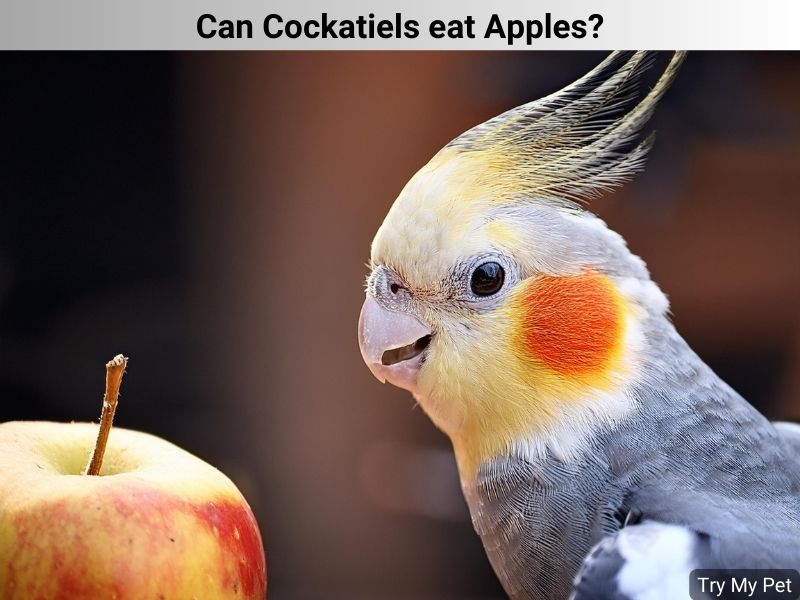This article provides an in-depth look at whether cockatiels can safely eat apples, including nutritional benefits, preparation tips, potential risks, and expert advice for incorporating this fruit into your bird’s diet. Cockatiels are one of the most popular pet birds around the world, known for their playful personalities and charming whistles. As responsible pet owners, it is essential to provide them with a balanced diet that meets their nutritional needs. Fruits and vegetables are a vital part of a cockatiel’s diet, but not all foods are safe for these feathered companions. One common question among cockatiel owners is: Can cockatiels eat apples? In this article, we will explore this question in detail, examining the benefits, risks, and guidelines for feeding apples to your cockatiel.
Nutritional Benefits of Apples for Cockatiels
High in Vitamins and Antioxidants
Apples are not just a delicious snack; they are also packed with essential nutrients. Apples are rich in vitamin C, which plays a crucial role in maintaining a cockatiel’s immune system and overall health. Vitamin C helps in the formation of collagen, a protein essential for the skin, blood vessels, and connective tissues. Additionally, apples contain antioxidants that can help combat oxidative stress, promoting healthy aging in birds.
Dietary Fiber for Digestive Health
Another significant benefit of apples is their high fiber content. Dietary fiber aids in digestion, helping to prevent issues such as constipation in cockatiels. A healthy digestive system is vital for your bird’s well-being, and incorporating fiber-rich foods like apples can support this.
Hydration
Fruits like apples have a high water content, which is beneficial for keeping your cockatiel hydrated. Proper hydration is essential for overall health, particularly in warmer climates or during the summer months when birds are more prone to dehydration.
Can Cockatiels Eat Apple Seeds?
Understanding the Risks
While apples themselves are generally safe for cockatiels, it’s essential to be aware of the potential risks associated with apple seeds. Apple seeds contain amygdalin, which can release cyanide when metabolized. Although the amount of cyanide in a few apple seeds is minimal, it is still advisable to remove the seeds before offering apple slices to your cockatiel.
Recommended Practices
To ensure your cockatiel’s safety, always wash apples thoroughly and remove the seeds and core before feeding. Cutting the apple into small, manageable pieces can also help prevent choking hazards and make it easier for your bird to eat.
Preparing Apples for Your Cockatiel
Washing and Cutting
Before offering apples to your cockatiel, it’s vital to wash them thoroughly to remove any pesticides or chemicals that may be present on the skin. After washing, cut the apple into small slices or cubes, ensuring that all seeds and the core are removed. This preparation makes it easier for your cockatiel to consume and enjoy the fruit.
Introducing Apples Gradually
When introducing apples or any new food to your cockatiel’s diet, it’s crucial to do so gradually. Start with small bites to gauge your bird’s interest and monitor for any adverse reactions. If your cockatiel enjoys apples, you can gradually increase the portion size.
How to Incorporate Apples into Your Cockatiel’s Diet
Variety is Key
While apples can be a healthy addition to your cockatiel’s diet, they should not be the sole fruit offered. Variety is essential in maintaining a balanced diet. In addition to apples, consider introducing other fruits such as bananas, pears, and berries. Each fruit provides different vitamins and nutrients that contribute to your bird’s overall health.
Mixing with Other Foods
Apples can be offered as a standalone snack or mixed with other foods. For example, you can chop apples and mix them with leafy greens or other vegetables. This combination not only adds variety but also enhances the overall nutritional value of your cockatiel’s meal.
Treats and Training
Apples can also serve as a rewarding treat during training sessions. Cockatiels are intelligent birds that enjoy learning new tricks. Using small apple pieces as a reward can motivate your cockatiel to engage in positive behaviors while also providing a healthy snack.
Potential Risks and Considerations
Allergies and Sensitivities
While apples are generally safe for cockatiels, some birds may have allergies or sensitivities to certain fruits. It’s essential to observe your cockatiel when introducing new foods. If you notice any signs of discomfort, such as vomiting or changes in behavior, discontinue feeding apples and consult your avian veterinarian.
Moderation is Important
Even healthy foods can lead to health issues if fed in excess. Apples contain natural sugars, which can contribute to obesity or other health problems in cockatiels if consumed in large quantities. Moderation is crucial; apples should be offered as an occasional treat rather than a daily staple.
Consult Your Veterinarian
If you have any concerns about your cockatiel’s diet or health, it’s always best to consult an avian veterinarian. They can provide personalized advice based on your bird’s specific needs and dietary requirements.
Conclusion: Can Cockatiels Eat Apples?
In summary, yes, cockatiels can eat apples! This delightful fruit can be a healthy and enjoyable addition to your cockatiel’s diet when prepared and offered correctly. Apples provide essential vitamins, antioxidants, and hydration that contribute to your bird’s overall health. However, it is vital to remove the seeds, wash the fruit thoroughly, and introduce it gradually to avoid any potential risks.
Remember, a varied diet is the key to a happy and healthy cockatiel. Incorporate apples along with other fruits and vegetables for a well-rounded nutritional profile. With the right care and attention, your cockatiel can enjoy the many benefits of apples while keeping its diet both delicious and nutritious.
By following the guidelines outlined in this article, you can confidently enrich your cockatiel’s diet with apples and provide it with a delightful treat that promotes health and happiness. Always prioritize safety, and consult with a veterinarian if you have any concerns about your bird’s dietary needs. Happy feeding!


